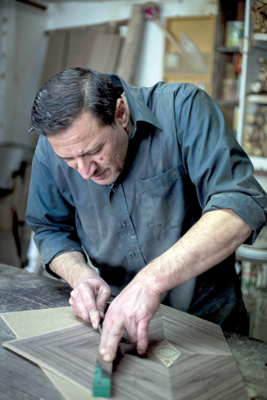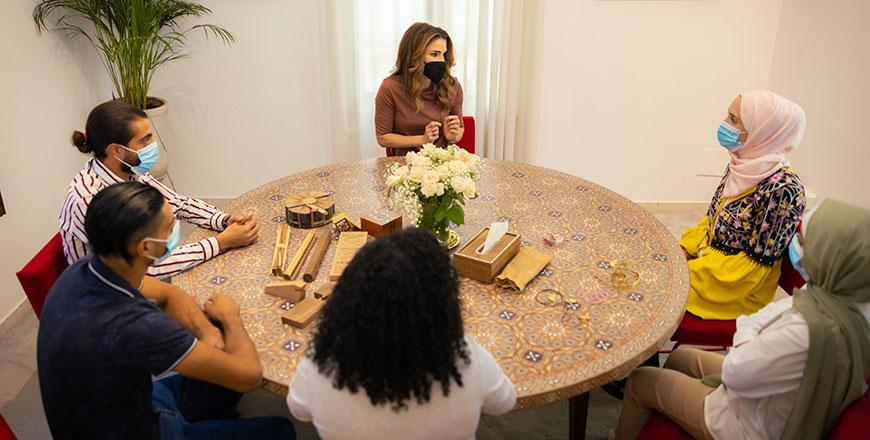You are here
Traditional crafts get new lease of life at Amman’s Turquoise Mountain
By Charlie Key - Jul 25,2023 - Last updated at Jul 25,2023

An artisan at work at the Turquoise Mountain in Amman (Photo courtesy of Turquoise Mountain)
AMMAN — Hidden just moments away from tourist-laden Rainbow Street, a tree-shaded courtyard reveals a small oasis of craftsmanship and artistry behind the windows of the Turquoise Mountain showroom.
Founded in 2006 by the UK’s King Charles, the non-profit organisation Turquoise Mountain aims to “revive historic areas and traditional crafts” and “provide jobs, skills and a renewed sense of pride”.
Initially established in Kabul, Turquoise Mountain now has presences in Jordan, Myanmar and Saudi Arabia.
In each of these locations, Turquoise Mountain works to “preserve the cultural heritage of endangered and displaced communities”, head of Design and Production Salma Al Qatawneh told The Jordan Times. “Cultural heritage may appear a somewhat vague concept to some, but the work of Turquoise Mountain is deeply practical. The organisation trains the next generation of artisans, ensuring that historic crafts and traditions do not die out.”
At the heart of the organisation’s work, as Qatawneh describes, is “rebuilding networks”. Traditional crafts depend ultimately on human connections; artisans need a pool of clients to sell to, and clients in turn need artisans to pass on their skills to the next generation, making Turquoise Mountain a symbiotic, self-sustaining model.
Following the outbreak of the conflict in Syria, many artisans who fled to Jordan found themselves disconnected from their clients and collaborators. Enter Turquoise Mountain, who gathered the immense skills and knowledge of these displaced artisans and connected them to international clients, making sure their skills are preserved.
The fruit of this work is not just a marketable product, Qatawneh insisted. Instead, it is a “form of documentation for our past”.
“When we view patterns created hundreds of years ago, we are sharing in an experience with those who came before us. Crafts allow a form of time-travel, allowing us to share in the visual landscape of our ancestors,” she said.
This work has not gone unnoticed. Qatawneh excitedly recounted the range of high-profile international clients requesting the services of Turquoise Mountain and its artisans. Well-known hotels in London are spurning factory-made furniture for the hand-made expertise of Jordanians, she explained.
The secret of Turquoise Mountain’s success lies in its recognition of its own limitations. The organisation knows it cannot compete in price or scale with larger manufacturers. Fortunately, they have no intention of competing; they have created a whole new market instead. Turquoise Mountain has built up a client base who explicitly does not want mass-produced goods, but products with a story and purpose behind them.
In doing so, Qatawneh said, Turquoise Mountain has made an unassuming house on the edge of Rainbow Street a hub for artisans and designers, motivated by a desire to “put Jordan on the map” for its repository of craftsmanship.
Related Articles
AMMAN — Her Majesty Queen Rania visited the Turquoise Mountain showroom in Jabal Amman on Monday, where she met with a group of local artisa
AMMAN — The Department of Antiquities and Turquoise Mountain Foundation on Sunday signed a memorandum of understanding to provide training o
Palestinian history is reflected in so many facets of life, especially in its fashion; its embroidery recounts a narrative of rich heritage and culture passed from one generation to another. I decided to focus on this theme for my make-up pages this month. I chose three local fashion and textile designers Lina Lama Burgan, May Khoury and Dana Rimawi, as my muses.
















